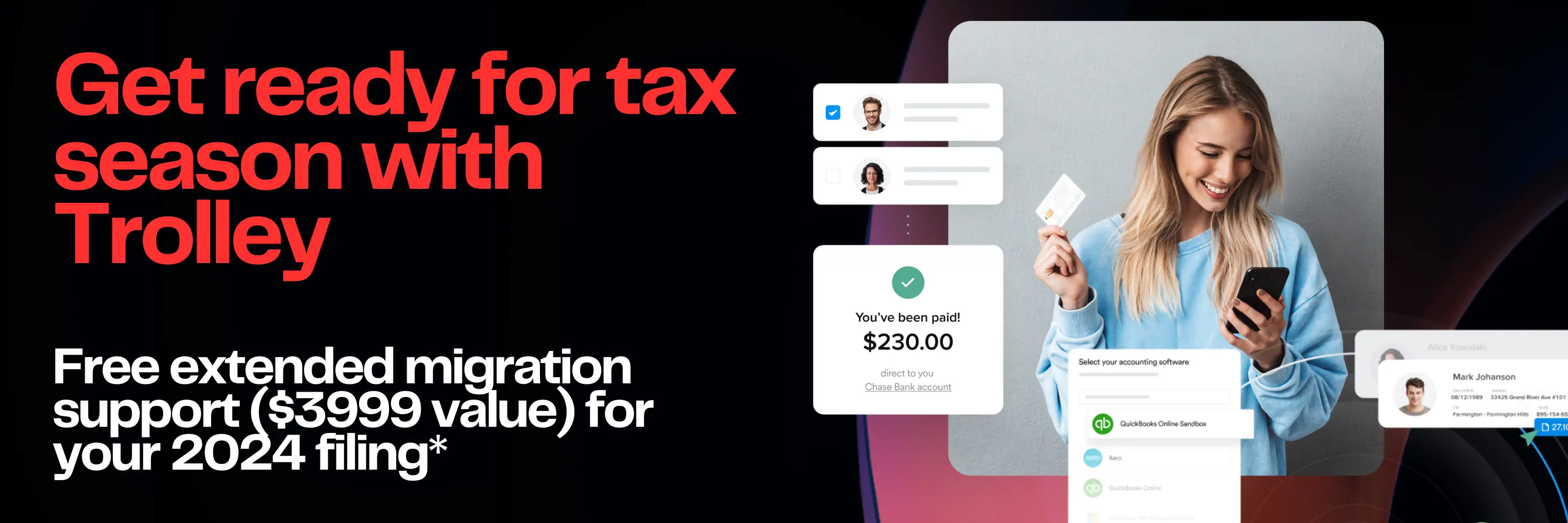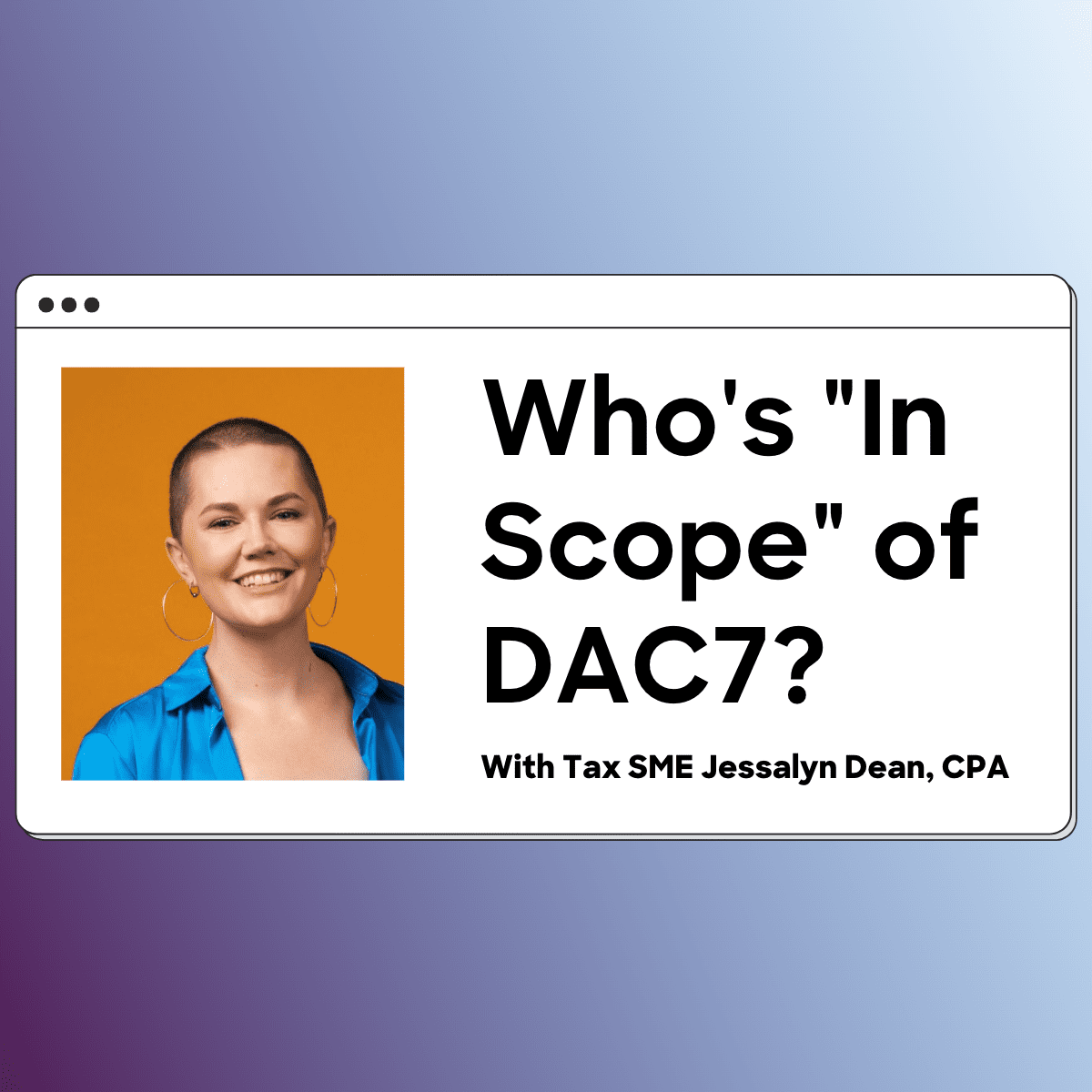In an era defined by digital dynamism and global connectivity, businesses face an ever-evolving landscape of regulations. One regulation garnering significant attention this year (2023) is the European Union’s seventh revision of their Council Directive (EU) on administrative cooperation in the field of taxation, also known as DAC7. This directive presents a crucial shift in how digital platforms are treated under European tax law, prompting many companies to question, “Does DAC7 affect my company?”
To shed light on this complex regulation, Trolley’s Tax Product Manager, Myles Foster sought insights from taxation subject matter expert, Jessalyn Dean, CPA. In an in-depth 1:1 interview, they unraveled the nuances of DAC7, its scope, and how it applies to businesses both within and outside the EU.
The implications of DAC7 are not confined to businesses located within the EU. Given the international nature of digital business, DAC7’s reach extends to numerous companies outside the European Union, leading to further confusion about the directive’s impact. This guide, featuring key insights from Myles and Jessalyn’s conversation, aims to clarify these complexities.
We begin our exploration by first delineating the kinds of businesses that fall within the purview of DAC7. By addressing this fundamental question, we hope to demystify DAC7 and provide a solid foundation for understanding its potential implications for your business. Whether you’re an EU-based entity or a global marketplace with sellers in the EU, this guide, enriched by professional expertise, is designed to help you navigate the intricacies of DAC7 and better assess its relevance to your operations.

Understanding the Basics: What is DAC7?
In short: The Directive on Administrative Cooperation in the field of taxation, or DAC7, is a tax directive from the Council of the European Union. Effective from January 1, 2023, it imposes additional reporting obligations on online marketplaces, requiring digital platforms to disclose sellers’ sales and revenue information.
The directive defines a digital platform as any software, including websites or mobile applications, that connects sellers with buyers of a relevant commercial activity. Major online marketplaces such as Uber, Etsy, and Airbnb fall under the DAC7 Directive.
Reporting requirements of DAC7 include disclosing seller’s information to tax authorities, such as name, address, country of residence, financial details, tax identification number, VAT or business registration numbers, and any fees, commissions, or taxes withheld.
If you want to take a deeper dive on exactly what DAC7 is, take a minute to catch up with our article DAC7: Is Your Online Platform Ready for the EU’s New Tax Rule?
Does DAC7 Apply to You? The Two-Part Test
Now that we understand what DAC7 is, let’s move on to a simple two-part test to help ascertain whether your business falls within its purview.
Step One: Are You a Platform?
Determining whether your company qualifies as a platform under DAC7 is an essential first step towards understanding your potential obligations. So, what defines a platform?
In the context of DAC7, a platform is considered to be a digital medium, such as a website, an application, or a software platform, which allows for the connection of buyers and sellers. The platform facilitates transactions between these two parties, acting as a marketplace for goods or services.
It’s crucial to understand that not all websites, apps, or software are classified as platforms under DAC7. For a digital medium to be considered a platform, it must allow buyers and sellers to engage in one or more of the following four types of activities:
- Provision of Services: If your platform allows for the selling of services, it falls within the DAC7 scope. These services can encompass a wide array of categories, such as consulting, creative services, or technical support, among others.
- Selling of Goods: Platforms facilitating the sale of physical products, from electronics to clothes, books to furniture, are under the DAC7 umbrella.
- Sales of Means of Transportation: Any platform involved in the selling or rental of means of transport, such as cars, bikes, or scooters, is within the scope of DAC7.
- Rental of Immovable Property: This category includes platforms that enable the rental of immovable property, such as residential or commercial real estate. For instance, vacation rental platforms fall into this category.
However, some digital mediums may not fall within the definition of a platform under DAC7. For example, payment processing software or advertisement listing websites typically do not qualify as they only facilitate transactions or ads, without a direct role in the actual transaction between the buyer and seller.
In summary, if your digital medium matches these descriptions and enables these types of transactions, it’s likely considered a platform under DAC7.
Step Two: Are You Subject to EU Rules?
As we proceed with our two-part test to determine if your platform falls under DAC7, the second critical question arises: Is your platform subject to EU rules? In the realm of digital business, this matter becomes increasingly complex due to the global nature of the internet and the cross-border reach of various platforms. Let’s break down the different scenarios that could place your platform within the purview of EU rules.
Scenario One: EU-Resident Platforms
If your platform is based in the EU, it is typically subject to EU rules. What defines an “EU-resident platform”? There are several determining factors:
- Tax Residency: If your platform pays taxes in an EU member state, it generally falls under the EU’s jurisdiction.
- Permanent Establishment: If your platform has a so-called ‘permanent establishment,’ such as an office, branch, or other fixed place of business in an EU member state, it is likely within the DAC7’s scope.
- Organization and Management: If your business is legally organized under the laws of an EU member state, or its management and control primarily occurs in an EU member state, it is typically considered as falling within the EU’s jurisdiction.
Scenario Two: Non-EU Resident Platforms
For platforms not residing in the EU, the rules shift slightly, but the influence of the EU can still extend its reach under certain conditions:
- EU-Based Sellers: If your platform hosts sellers with a primary address in an EU member state, you are under the scope of DAC7. This means that even if your platform operates outside the EU, the presence of EU-based sellers on your platform brings you within the EU’s jurisdiction.
- Real Estate in EU: If your platform facilitates the rental of immovable property located in an EU member state, you fall within DAC7’s scope, irrespective of the seller’s address. For instance, if a UK-based platform hosts a UK-based seller who is renting out an apartment located in Italy, the platform is subject to EU rules.
In Conclusion
Since every country in the EU is implementing the DAC7 directive in their own way, navigating the scope of EU rules for digital platforms can be a complex process, but understanding the rules is crucial for businesses operating in today’s global digital economy.
Whether your platform is based within the EU or elsewhere, the geographical location of your sellers and their properties may still bring you within the scope of DAC7. As always, we recommend seeking legal advice to fully understand how these rules apply to your specific situation.
Curious about what Trolley can do to help your online marketplace comply with DAC7 regulations when paying EU sellers? Learn more about the new DAC7 compliance product or follow our step-by-step guide to enable DAC7 features in your account.
If you have any questions about DAC7, feel free to reach out, and we’d be happy to help!
This article is intended for educational and informational purposes only. Through the publication of this article, Trolley is not offering any legal, taxation, or business advice. We strongly encourage each reader to consult with their relevant lawyer, accountant, or business advisors with respect to the content of this post. Trolley assumes no liability for any actions taken based on the content of this or other articles.












